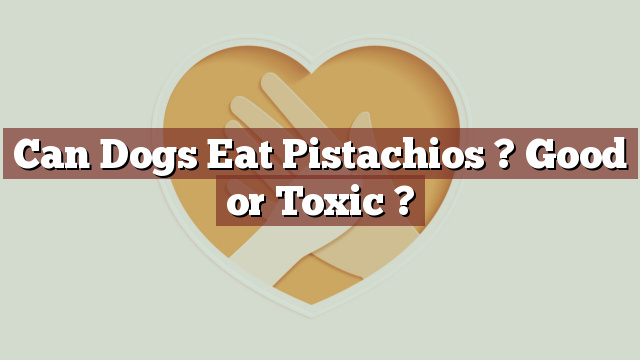Can dogs eat pistachios? This is a common question among dog owners who want to ensure the health and well-being of their furry companions. It is important to be aware of the foods that are safe for dogs to consume, as some human foods can be harmful or even toxic to them. In this article, we will explore whether or not dogs can safely eat pistachios and discuss the potential risks and benefits associated with their consumption.
Nutritional Value of Pistachios: What Do They Contain?
Pistachios are not only delicious but also packed with essential nutrients. They are a good source of protein, fiber, healthy fats, vitamins, and minerals. Pistachios are rich in vitamin B6, thiamine, potassium, and phosphorus. Additionally, they contain antioxidants such as lutein and zeaxanthin, which are beneficial for eye health.
Can Dogs Eat Pistachios? Good or Toxic for Their Health?
No, dogs should not eat pistachios. While pistachios may be a nutritious snack for humans, they can pose a risk to dogs. The shells of pistachios can be a choking hazard and may cause intestinal blockage if ingested by dogs. Moreover, pistachios are high in fat, which can lead to digestive upset and even pancreatitis in dogs.
According to veterinary experts, the high fat content in pistachios can put a strain on a dog’s digestive system, leading to vomiting, diarrhea, or stomach upset. Furthermore, the salt content in salted pistachios can be harmful to dogs, potentially causing sodium ion poisoning or electrolyte imbalances.
Potential Risks and Benefits of Dogs Consuming Pistachios
As mentioned earlier, the risks associated with dogs consuming pistachios outweigh any potential benefits. The potential risks include choking, intestinal blockage, digestive upset, pancreatitis, sodium ion poisoning, and electrolyte imbalances. It is crucial to prioritize the health and safety of your dog by avoiding feeding them pistachios altogether.
What to Do if Your Dog Eats Pistachios: Steps to Take
If you suspect that your dog has eaten pistachios, it is important to take immediate action. Monitor your dog for any signs of distress, such as vomiting, diarrhea, or difficulty breathing. If you notice any unusual symptoms or if your dog has ingested a large amount of pistachios, it is recommended to seek veterinary assistance.
A veterinarian will be able to assess your dog’s condition and provide appropriate guidance. They may recommend inducing vomiting, administering activated charcoal, or conducting further medical procedures if necessary. Remember, acting quickly can make a significant difference in the outcome for your dog.
Can Dogs Safely Enjoy Pistachios? Consider Moderation and Alternatives
Given the potential risks associated with pistachios, it is best to avoid feeding them to your dog altogether. However, if you still wish to treat your canine companion to a nutty snack, consider safe alternatives such as unsalted and shelled peanuts or cashews. But even with these alternatives, moderation is key. Nuts should never make up a significant portion of a dog’s diet, as they are high in fat and calories.
In conclusion, dogs should not eat pistachios due to the potential risks they pose to their health. While pistachios offer nutritional benefits to humans, they can be harmful or even toxic to dogs. It is always important to prioritize the well-being of your furry friend and consult with a veterinarian regarding their diet. By being aware of safe foods for dogs and making informed choices, you can help ensure a long and healthy life for your beloved pet.
Thank you for investing your time in exploring [page_title] on Can-Eat.org. Our goal is to provide readers like you with thorough and reliable information about various dietary topics. Each article, including [page_title], stems from diligent research and a passion for understanding the nuances of our food choices. We believe that knowledge is a vital step towards making informed and healthy decisions. However, while "[page_title]" sheds light on its specific topic, it's crucial to remember that everyone's body reacts differently to foods and dietary changes. What might be beneficial for one person could have different effects on another. Before you consider integrating suggestions or insights from "[page_title]" into your diet, it's always wise to consult with a nutritionist or healthcare professional. Their specialized knowledge ensures that you're making choices best suited to your individual health needs. As you navigate [page_title], be mindful of potential allergies, intolerances, or unique dietary requirements you may have. No singular article can capture the vast diversity of human health, and individualized guidance is invaluable. The content provided in [page_title] serves as a general guide. It is not, by any means, a substitute for personalized medical or nutritional advice. Your health should always be the top priority, and professional guidance is the best path forward. In your journey towards a balanced and nutritious lifestyle, we hope that [page_title] serves as a helpful stepping stone. Remember, informed decisions lead to healthier outcomes. Thank you for trusting Can-Eat.org. Continue exploring, learning, and prioritizing your health. Cheers to a well-informed and healthier future!

